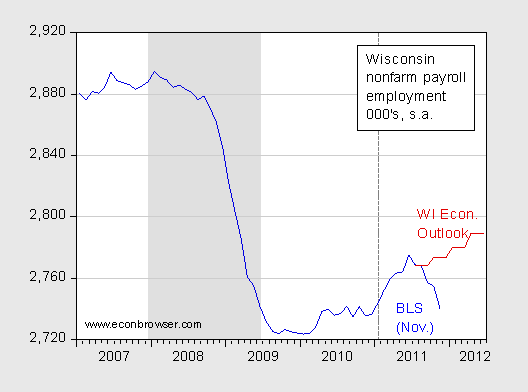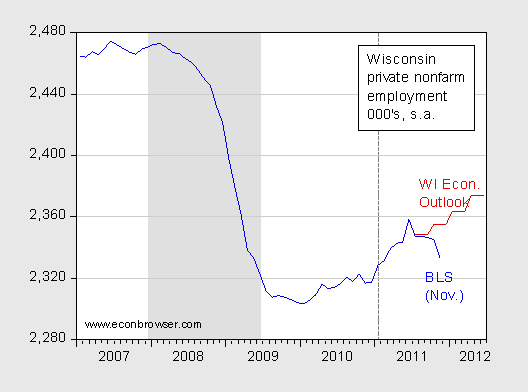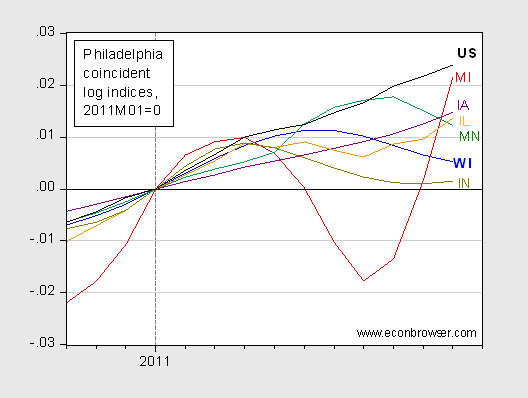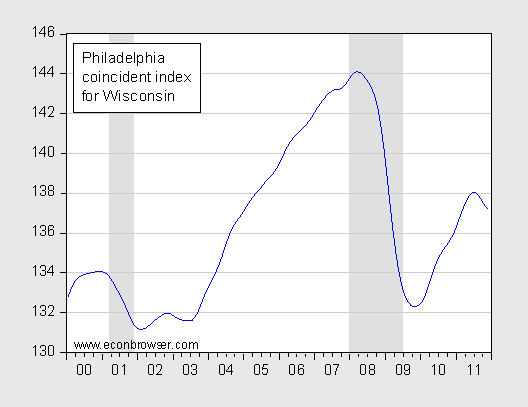As Governor Walker begins a tour of the state to tout a new jobs plan [0], it might be useful to review economic conditions in Wisconsin. Briefly put, Wisconsin employment (total, private) continues to decline, and Wisconsin’s coincident indicator continues to diverge from the US indicator (as well as most other of the region’s indicators). Hence, points made in previous posts [1] [2] still seem applicable.
First, Wisconsin nonfarm payroll employment continues to decline.

Figure 1: Wisconsin nonfarm payroll employment from BLS (blue) and projections from October Wisconsin Economic Outlook, in 000’s. NBER defined recession dates shaded gray. Vertical line at 2011M01. Sources: BLS, Wisconsin Economic Outlook and NBER.
Second, Wisconsin private nonfarm employment continues to decline.

Figure 2: Wisconsin private nonfarm payroll employment from BLS (blue) and projections from Wisconsin Economic Outlook, in 000’s. NBER defined recession dates shaded gray. Vertical line at 2011M01. Sources: BLS, October Wisconsin Economic Outlook and NBER.
Given these trends, it is no wonder that most observers believe Governor Walker’s goal of adding 250K jobs by 2015 will not be achieved. [3]. After all, private employment is essentially back to where it was when Governor Walker took office, while nonfarm payroll employment is below.
Third, Wisconsin economic activity continues to decline, in contrast to the national indicators and the indicators for the other states in the region.

Figure 3: Log coincident index for Wisconsin (WI, bold blue), Illinois (IL, gold), Indiana (IN, chartreuse), Iowa (IA, purple), Michigan (MI, dark red), Minnesota (MN, green), and US (bold black), all rescaled to 2011M01=0. Vertical line at 2011M01. Source: Federal Reserve Bank of Philadelphia and author’s calculations.
As mentioned earlier, the Governor is pushing a new jobs plan. From Sheboygan press:
MADISON (AP) — Gov. Scott Walker announced Monday he is creating a new council to help better prepare students for college and careers.
The move comes after Walker and the Legislature last year cut $71 million over two years from funding for Wisconsin’s technical colleges, whose primary mission is to train students for available jobs.
…
The substantive component of the plan seems to involve more job fairs.
Walker said the Department of Workforce Development will double the number of job fairs it holds across the state to 100 this year in hopes of getting the unemployed into current vacancies.
[Update, 11AM PST, 1/11] Reader aaron states (9:23AM, 1/11):
Wisconsin was in really bad shape before the recession.
Below I plot the Philadelphia Fed’s coincident index as a summary of economic activity.

Figure 4: Coincident index for Wisconsin. NBER defined recession dates shaded gray. Source: Federal Reserve Bank of Philadelphia and NBER.
This graph (and my recollection) seems to be at odds with that characterization.
Walker’s policies have been an epic failure.
I’m reminded of a guy I knew years and years ago. His family was tied to the Duvalier regime in Haiti. If you questioned the lot of ordinary Haitians, he’d say something like, “The workers in Haiti are happy and love their country” and nothing more. The workers in Wisconsin are happy and love the state.
I’m also reminded of a Chelm story (by Sholom Aleichem) in which there was a shortage of sour cream. This was “solved” by the elders of Chelm by declaring that water was now sour cream. (BTW, this story’s “doublespeak” pre-dates Orwell’s 1984 by decades.)
Wisconsin was in really bad shape before the recession.
This is also to be expected. What matters is what happens a few years out. If the private sector is doing better, I’ll call that a success.
aaron: Please see Figure 4 which I have added to the post. I do not understand the basis for your assertion.
Ah. My memory was bad. I was working in Oshkosh often 2007-2010. I noticed it very bad, it was actually during the recession, but before it was called.
I got my concealed carry license last week, and went to Sendiks to hunt some turkey. When I pulled it out, everyone everyone screamed and ducked for cover…
Scott Walker, like most all politicians, has little affect on the real economy- hence he and the Wisconsin Republican party’s fixation on ideological initiatives.
Politicians normally (and temporarily) juice the economy with unfunded programs to aid their political supporters. Walker’s somewhat unique in that he’s either brave or stupid enough to stir up students, public employees, and a normally corpulent Democratic party in an effort to improve the bureaucratic and taxation burden on business.
For sure, in the short term, contraction of local and state government expenditures will reduce state employment and commerce…In the medium term, the inevitable fiscal austerity coming to Washington and the banking system will take another bite out of the economy. Election excitement will embolden Republicans to stop flinching with the continuing budget resolutions… In the long term, Wisconsin will be better off with a smaller and more efficient government. Unfortunately it will be the poorest and weakest that will again pay the price for fiscal discipline.
Last- Thank you Menzie for “Lost Decades”, and for the Econobrowser. Your efforts to clear the fog and educate the hoi polli have definitely topped off your reserves of Karma.
Walker has essentially save the WI school system with district after district improving their financial conditions and retaining teachers that were scheduled for layoff. Now if the left will let him reduce the shackles on productive businesses WI could see an economic explosion. Of course that would mean killing a lot of government sacred cows and left leaning academics just can’t stomach that.
Commemts from a Wisconsin friend:
We used to make things here in Wisconsin . We made machine tools in Milwaukee , cars in Kenosha and ships in Sheboygan . We mined iron in the north and lead in the south. We made cheese, we made brats, we made beer, and we even made the napkins to clean up the beer we spilled. And we made money.
Reality check: here are our top 10 employers in Wisconsin today:
Walmart
University of Wisconsin–Madison
Milwaukee Public Schools
U.S. Postal Service
Wisconsin Department of Corrections
Menards
Marshfield Clinic
Aurora Health Care
City of Milwaukee
Wisconsin Department of Veterans Affairs.
That is where a century of progressivism will get you. That and a $3.6 billion structural deficit.
Ricardo: Gee, I wonder where DoD has ranked in the US economy over the past 50 years…A sectoral breakdown might be more useful, I think.
Sorry Menzie. I didn’t know that Wisconsin had a DoD. What is its budget?